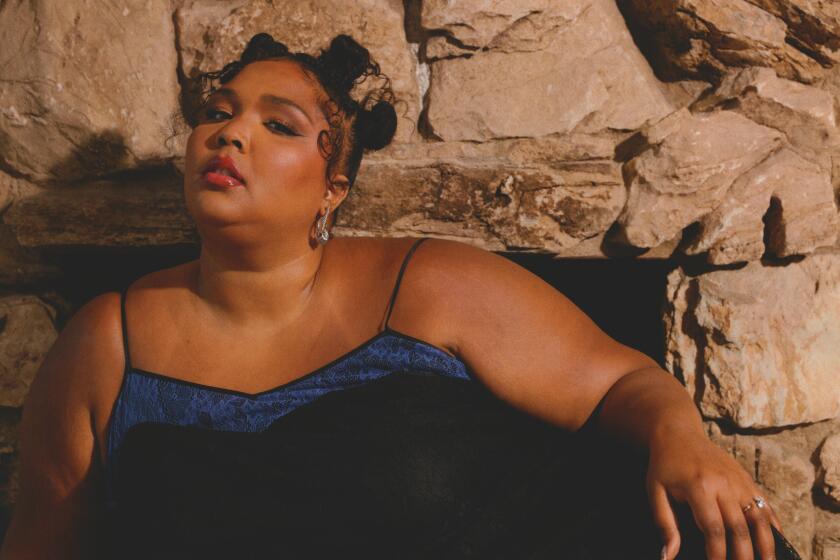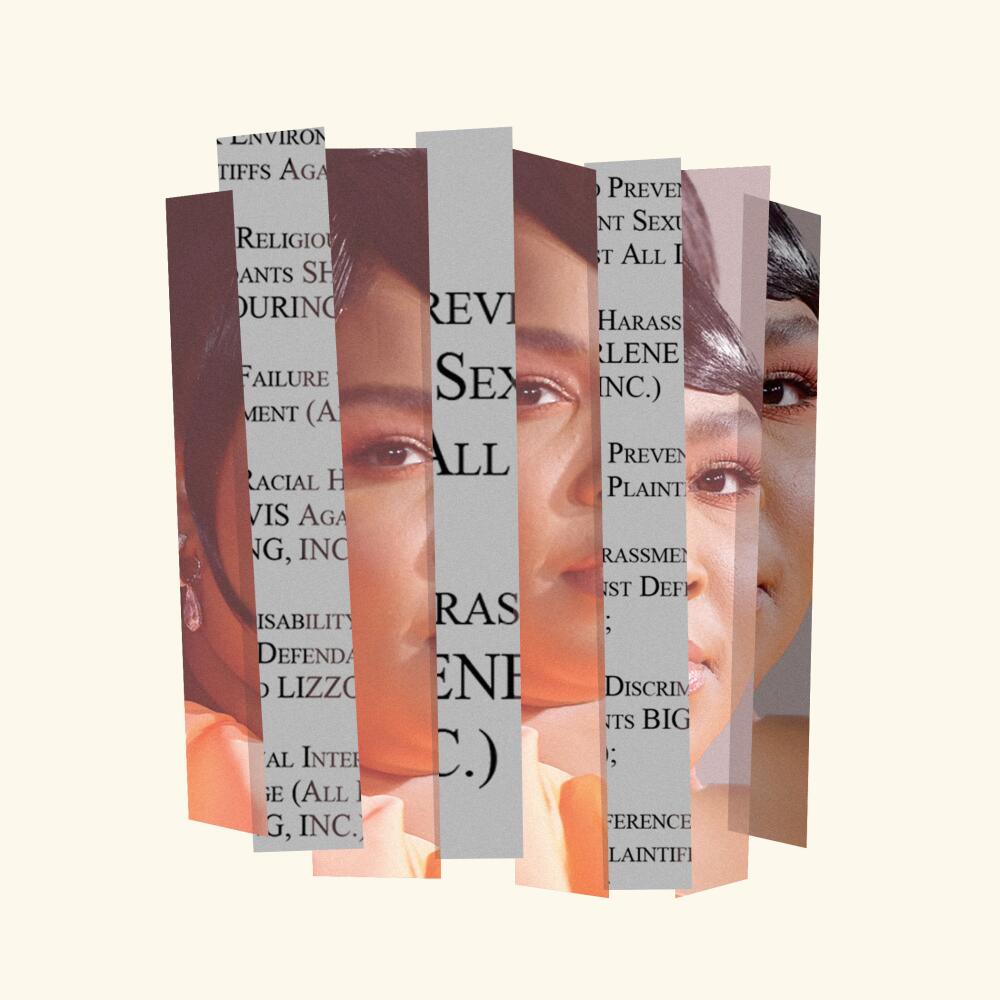
- Share via
In February, the pop singer Lizzo won the Grammy for record of the year for “About Damn Time,” her exuberant 2022 disco-funk single. Overjoyed at the honor, she took the stage at Crypto.com Arena in downtown Los Angeles and summed up what a triumph it was for larger women of color like her who long struggled to find a place in the entertainment industry.
“Now I look around and there’s all these songs that are about loving our bodies and feeling comfortable in our skin and feeling f—good, and I’m just so proud to be a part of it,” Lizzo, born Melissa Jefferson, said.
“Anybody at home who feels misunderstood or on the outside looking in like I did, just stay true to yourself,” she continued, “I promise you, you will find people, you will attract people in your life who believe in you and support you.”
Just six months after that high point in her career, Lizzo is now confronting allegations that threaten to undo years building a hard-won image as a beacon of empowerment and self-acceptance. A singer seen as an agent of change in the music industry has, for some, come to symbolize its entrenched problems.
Three of Lizzo’s former backup dancers recently sued Lizzo and her company Big Grrrl Big Touring, alleging sexual harassment and creating a hostile work environment for the marginalized women she’d encouraged on the Grammy stage.
The claims include allegations of being pressured to touch dancers during a live nude performance in Amsterdam; racial, size and religious-based harassment; and one dancer being forced into an hours-long rehearsal until she soiled herself from exhaustion.

Subscribers get exclusive access to this story
We’re offering L.A. Times subscribers special access to our best journalism. Thank you for your support.
Explore more Subscriber Exclusive content.
“It’s really hard to believe that somebody that you almost think could do no wrong, did so much wrong,” Crystal Williams, one of the dancers in the suit, told The Times in an interview. “I felt the need to even come forward publicly because this is not only her that does things like this. This is normalized in the entertainment industry in general.”
Lizzo has dismissed the allegations as “false” and “outrageous.”
“These last few days have been gut wrenchingly difficult and overwhelmingly disappointing,” the 35-year-old singer wrote on Instagram on Aug. 3.
“I am not the villain that people and the media have portrayed me to be the last few days,” she said. “There is nothing I take more seriously than the respect we deserve as women in the world. I know what it feels like to be body shamed on a daily basis and would absolutely never criticize or terminate an employee because of their weight.”
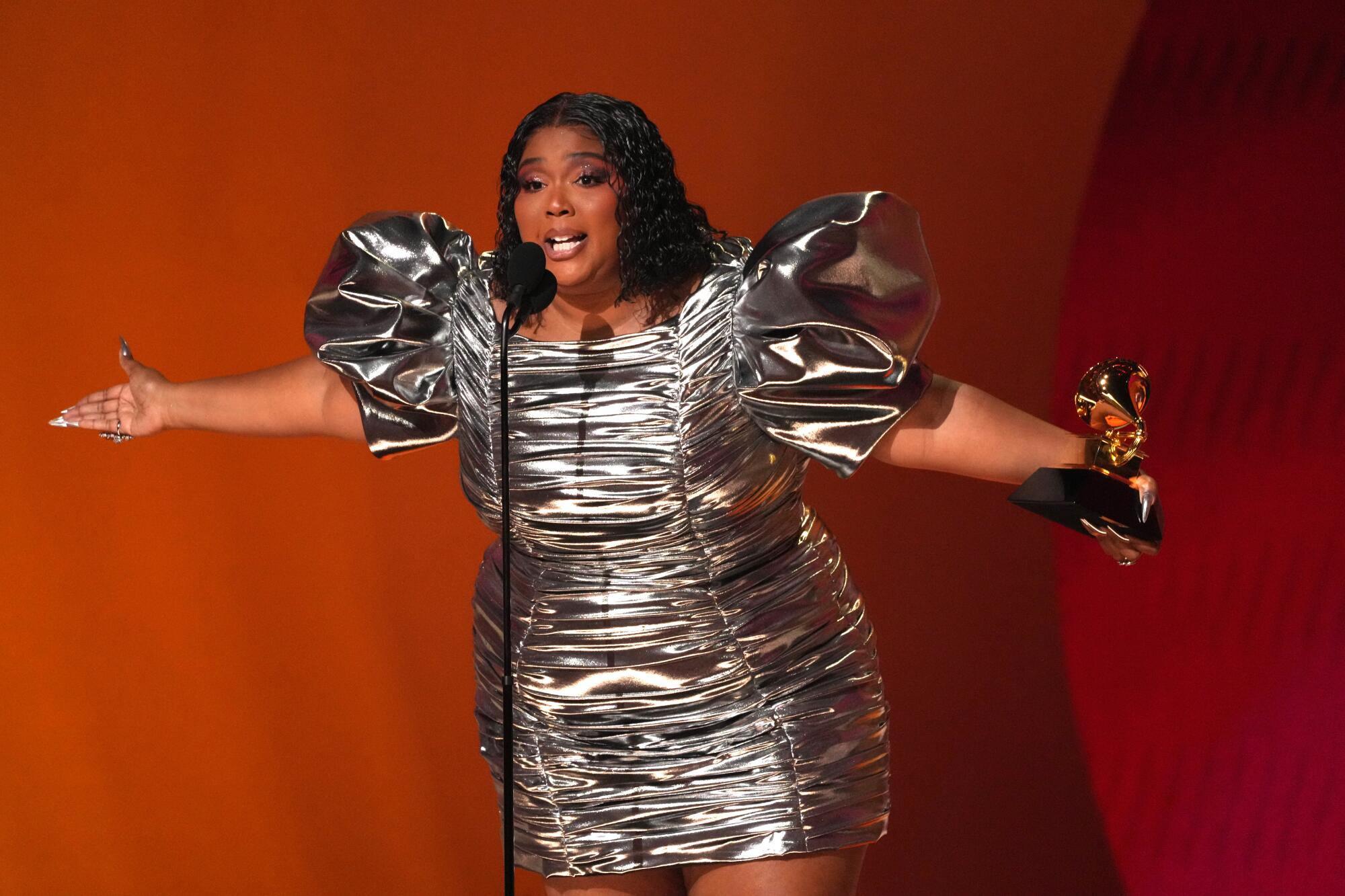
Lizzo’s attorney Martin Singer said in a statement that claims against Lizzo and Big Grrrl Big Touring are “provably false and without merit, and that will be established in the pending litigation with significant documentary evidence and witness testimony.”
Singer noted that Lizzo’s current dancers took to Instagram to voice their support for the singer in a statement that “completely contradicts” the lawsuit’s allegations.
“We have had the time of our lives on The Special Tour,” they wrote and signed Thursday under the collective “the Big Grrrls and Big Boiiis.” “We have been so honored to share the stage with such amazing talent.”
The controversy represents an extraordinary turn of events for one of pop’s most visible stars.
Lizzo’s influence has extended well beyond the music charts. Outspoken and unabashed, the self-described “big grrrl” spread her message of body positivity on social media, music videos, commercials, documentaries and reality TV, award shows and a passel of products, becoming culturally ubiquitous in the process.
With her dance competition series “Lizzo’s Watch Out for the Big Grrrls,” and a new project she can’t yet discuss, the singer is embracing her journey -- and herself.
Lizzo’s predicament bears comparisons to the blowback confronted by other celebrities, politicians and religious leaders whose private conduct clashed with the values they espoused publicly.
The hit to her reputation is “harder than many,” said Molly McPherson, a crisis communications expert. “It’s not only the sheer hypocrisy of it, but letting down so many of her fans that not only believed in her, they bought into her.”
A symbol of acceptance
Until the suit, Lizzo had a near-unblemished status as one of pop’s most inspirational acts.
Born in Detroit, she trained as a flautist from a young age (last year, Lizzo famously played President James Madison’s 200-year-old crystal flute at the Library of Congress).
Lizzo signed with Atlantic Records in 2016, and broke through with 2019’s album “Cuz I Love You,” which peaked at No. 4 on the Billboard 200.
She performed at Coachella, and after 2017’s single “Truth Hurts” became a surprise TikTok hit, she re-released it and earned her first No. 1 single. The Times called her “the one thing we all loved in 2019.”
The musical artist symbolized a crack in the ceiling that kept other shape-diverse artists from popular success. She signed lucrative branding deals, including for her own shapewear line Yitty, and partnered with Amazon on a reality show for plus-sized dancers, “Lizzo’s Watch Out for the Big Grrrls,” some of whom she cast into her live tour. Last year, “About Damn Time” topped the Billboard Hot 100, and Lizzo performed the main theme for this summer’s smash “Barbie” movie.
There were minor stumbles. Last year, Lizzo settled a suit over songwriting credits for “Truth Hurts” after a federal judge dismissed key claims of the case; and she faced criticism after lambasting a food delivery driver on social media.
A Lizzo entity and other parties in February also settled with performers after footage of them during rehearsals for the 2019 VMA Awards was used in the 2022 documentary “Love, Lizzo” without their permission, according to sources close to her dance team and copies of agreements viewed by The Times.
Singer said the matter was resolved when the production company made an appropriate payment for clearance of the rights for use of the footage, adding that “Lizzo had nothing to do with it and knew nothing about it.”
Even when fans criticized her for using the word “spaz” in a song, she publicly apologized, revised the lyric and seemed to come out ahead.
Then came the lawsuit by former dancers Williams, Arianna Davis and Noelle Rodriguez.
Their lawsuit, filed Aug. 1 in Los Angeles County Superior Court, alleges that dancers, well aware of the rarity of work for plus-sized women, were kept in a tenuous, sexually charged work atmosphere and harassed for their size.
For Williams, who graduated from Sam Houston State University in Texas in 2020 and had gotten her start doing background work in a Megan Thee Stallion video and Nick Cannon’s “Wild ‘N Out,” being cast in “Watch Out for the Big Grrrls” was an instant leg up into a dance career. So fast, in fact, that Lizzo brought her onto her 2021 tour after just a few days of taping.
“Being the artist that she is and her having the brand that she does, it was bigger than dance for me,” said Williams, 26. “But I never really got to see her in private until the cameras weren’t rolling.”
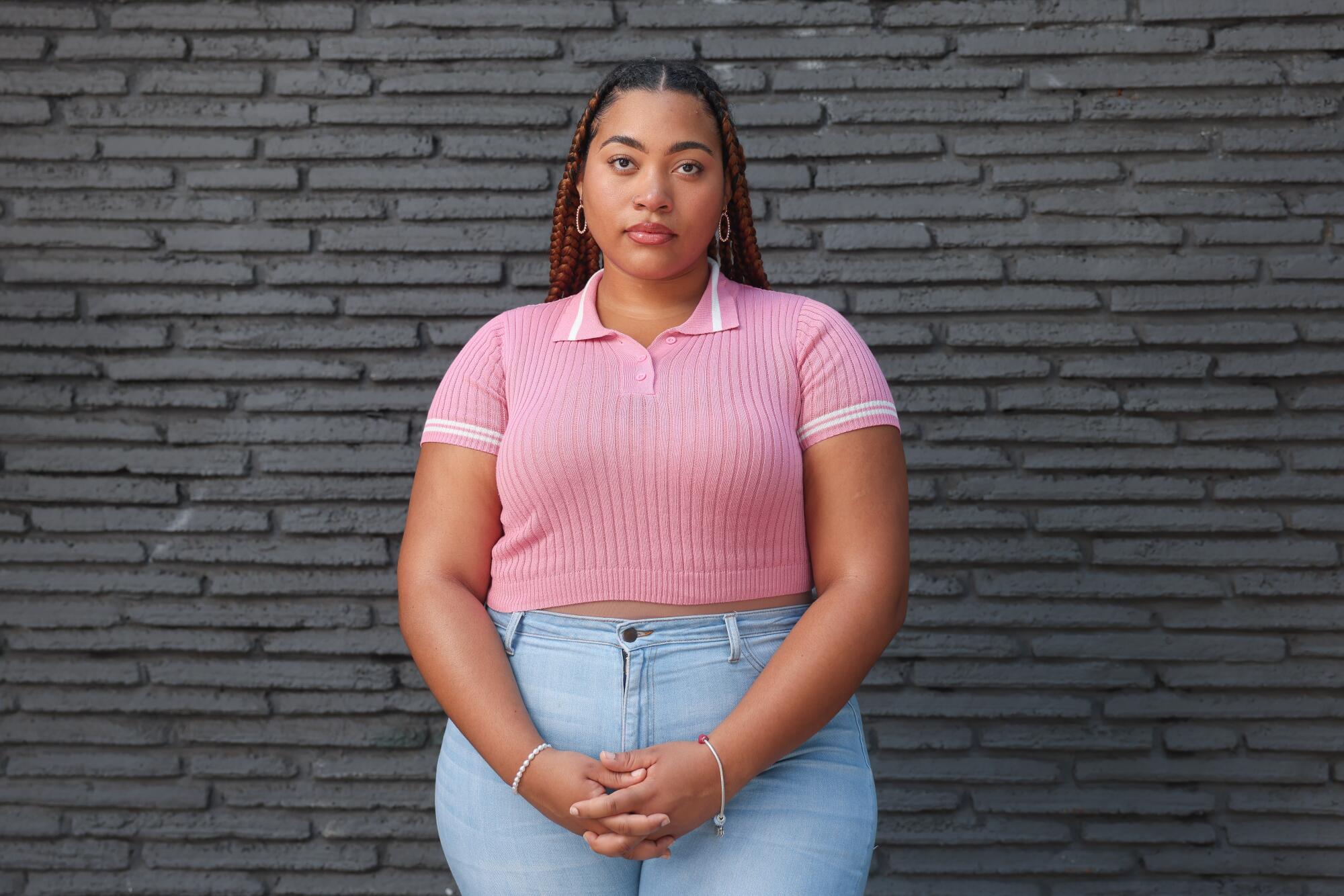
Williams and other dancers allege in their suit that Lizzo and her management berated them over claims that they were drinking on the job, which they denied.
When they asked to be paid a salary between tours — they asserted they were discouraged from taking other work — the suit contends BGBT’s accountant accused them of engaging in “‘unacceptable and disrespectful’ behavior” while on tour. The dancers eventually secured a 50% salary between tours.
The dancers further alleged that management treated Black members of the dance team differently than other members.
“BGBT’s management team consisted almost entirely of white Europeans who often accused the Black members of the dance team of being lazy, unprofessional, and having bad attitudes,” the suit states.
Williams said in the lawsuit that she was laid off in April due to budget cuts, but suspects it was retaliation for speaking up.
“Whenever we advocate for ourselves, there’s backlash,” Williams said in an interview. “When management said ‘They’re difficult to work with,’ it’s like ‘So, did you mean the Black girls?’”
Other dancers said they were subjected to more humiliating treatment, according to the lawsuit.
Davis alleged that Lizzo expressed “thinly veiled concerns” about her weight gain and pressured her and other dancers to touch nude performers at a club in Amsterdam.
During a grueling re-audition for the dancers in April, Davis said in the suit, “she was afraid that if she left the stage at any point during the audition she would be fired. Ms. Davis pressed on as long as she could until she eventually lost control of her bladder.”
Later that month, after Rodriguez quit the tour, the suit says that “Lizzo aggressively approached Ms. Rodriguez ... exclaiming, ‘You’re lucky. You’re so f— lucky!’ Ms. Rodriguez feared that Lizzo intended to hit her and would have done so if one of the other dancers had not intervened.”
Singer, Lizzo’s attorney, called the allegations specious and noted that all the dancers returned to the second leg of the Lizzo tour after the alleged incidents in Amsterdam.
He said Davis’ claims in particular lack credibility. He cited an audition tape she made in April — after most of the claims of harassment and mistreatment are alleged to have occurred — in which she praised Lizzo.
“The audition tape by Ms. Davis establishes that she had no issues with Lizzo and her decision to reup for the next leg of the tour confirm that the alleged claims are specious fabrications,” Singer wrote.
He said both Davis and Williams were terminated for cause and that Williams was not told it was because of “budget cuts.” An investigation found the claims from the dancers were “completely without merit,” Singer added.
Davis, in a statement, said that she praised Lizzo in the video because she wanted to keep her job.
“Right up until the last minute, I didn’t realize how bad it was and how much I was being taken advantage of,” Davis said. “I just genuinely wanted to save my job.”
The Lizzo effect
For Lizzo, the dancers’ claims against her mark a dramatic reversal in the singer’s career.
She had leveraged her message of inclusivity and body positivity to become not just one of the music industry’s brightest stars, but a symbol of acceptance and aspiration, embraced by millions of fans who saw themselves in her unbridled self-love, self-empowerment and confidence. Her impact was sometimes deemed “the Lizzo effect” for its culture-shifting expansion of what stars could look like.
Lizzo amplified her message on social media and with savvy brand ambassadorships and partnerships highlighting her credo.
There was the Absolut Juice collaboration with Absolut Vodka to celebrate Lizzo’s feel-good 2019 single “Juice.”
Lizzo’s performance at the 2022 MTV Video Music Awards also saw the premiere of her commercial for Instacart, “The World is your Cart,” with a remix of her song “The Sign” and a verified list of Lizzo’s own favorite list of groceries made available on Instacart’s app.
Last year, her reality show “Lizzo’s Watch Out for the Big Grrrls” won three Emmys, including outstanding competition program. The show was part of Lizzo’s first-look deal signed with Amazon Studios in 2020. The deal was extended this year in April.
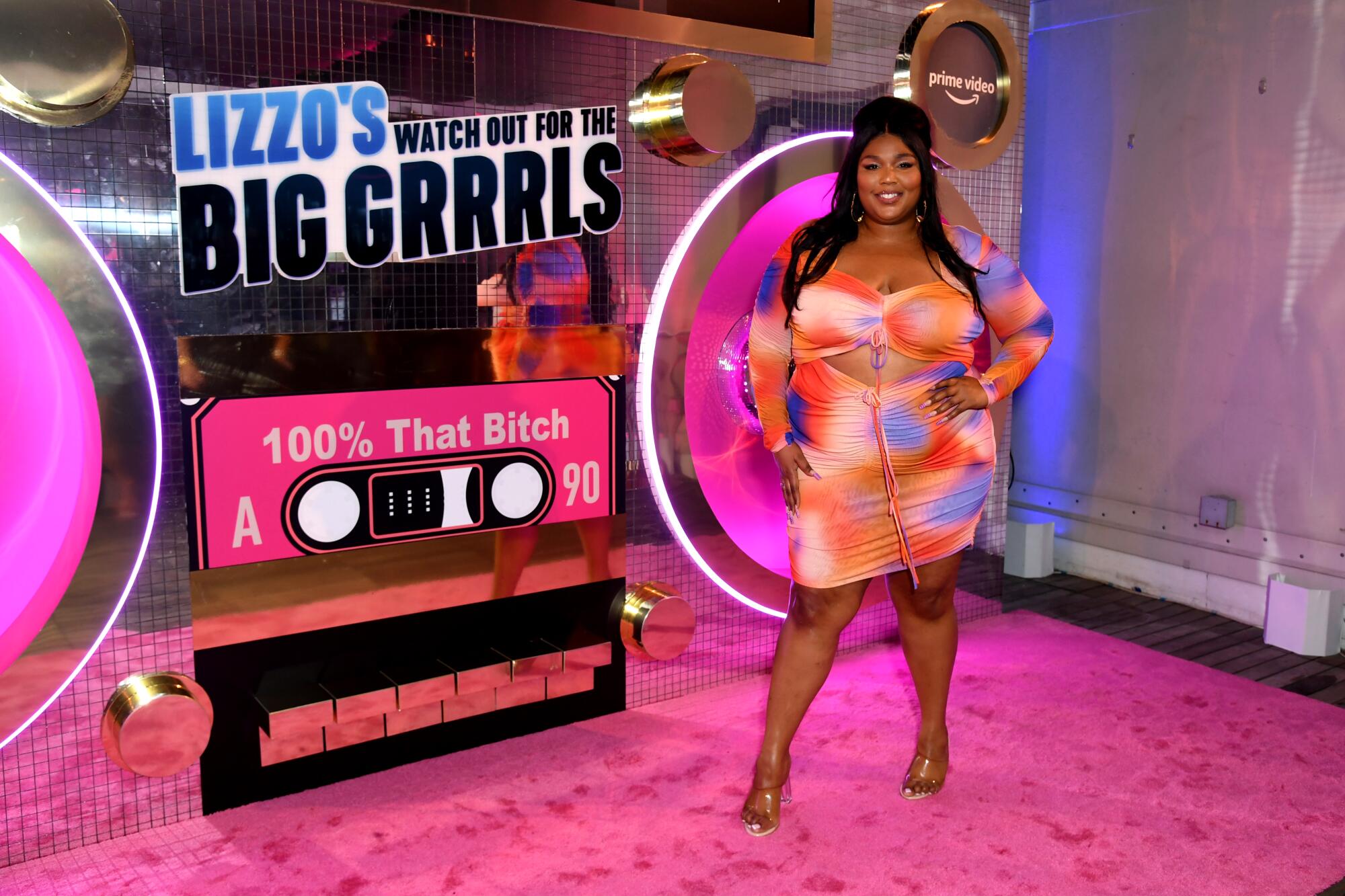
Then there was the debut last year of Yitty, a gender affirming shapewear line designed to change the idea of shapewear — not the perception of one’s body. Sales are estimated to reach $100 million this year, according to Business of Fashion.
None of the brands that once touted their relationships with Lizzo have publicly addressed the singer or the claims against her.
Amazon Studios declined to comment on Lizzo or about whether a second season of “Lizzo’s Watch Out for the Big Grrrls,” is underway.
A spokesperson for Instacart said the company’s relationship with the singer was limited to the campaign that ran from August 2022 to this February with no plans for a follow-up.
Still, since the allegations came to light, the fallout has been swift.
Lizzo’s sales and streaming activity have dropped, Billboard reported, citing data from music data firm Luminate. Between Aug. 1 and Aug. 8, the singer’s daily on-demand audio streams dropped 21.7% in the U.S. while her track sales fell 35% — half of which are the result in a fall in sales from “Pink,” Lizzo’s contribution to the “Barbie” soundtrack.
The two-day Made in America Festival that Lizzo was set to headline in September was abruptly canceled just weeks before showtime.
Representatives for the festival declined to comment.
Singer said Lizzo “had nothing to do with its cancellation, which was a decision made by the promoters based on weak ticket sales.”
Social media reaction to Lizzo’s statement responding to the lawsuit has been brutal, often laced with the same fatphobia and misogynoir that Lizzo and her team stand accused of.
“No one wants to think of Lizzo ‘the brand’ for what she truly is. A BULLY with an attitude problem,” one person posted on Instagram.
A growing chorus of other complaints quickly followed.
A day after the lawsuit was filed, filmmaker Sophia Nahli Allison took to social media to complain about Lizzo’s alleged conduct.
Allison, whose 2019 short film “A Love Song for Latasha” was nominated for a best documentary short subject Oscar, wrote on X (formerly Twitter), that she dropped out of directing a Lizzo documentary two weeks in, saying that she “was treated with such disrespect,” and called Lizzo “a narcissistic bully,” who “has built her brand off of lies.”
Allison declined to elaborate on her claims, telling The Times: “This is my truth.”
Singer said in a statement that Allison “lashed out against my client” over creative differences with producers and Lizzo.
“She has obvious animosity and hostility toward Lizzo ... nobody, including my client, acted inappropriately or disrespectfully toward Ms. Allison,” he said.
In the weeks following the lawsuit, Lizzo lost some 300,000 followers on TikTok, according to the social statistics site Social Blade. She lost 219,630 Instagram followers and 33,127 on Twitter (she still has 26.7 million TikTok followers, 13.3 million Instagram followers and 2.2 million followers on X).
To Lizzo’s millions of fans, the claims of fat shaming, toxicity and sexual harassment appear to be a betrayal of their bond with her.
“Lizzo achieved success not just with being relatable around her image and her body positivity,” said McPherson, the crisis communications expert. “People loved her for her difference and being able to embrace that. She spoke to an audience, particularly on social media, particularly using music, to say, ‘Not only do I see you and relate to you and look like you, you can be me someday.’”
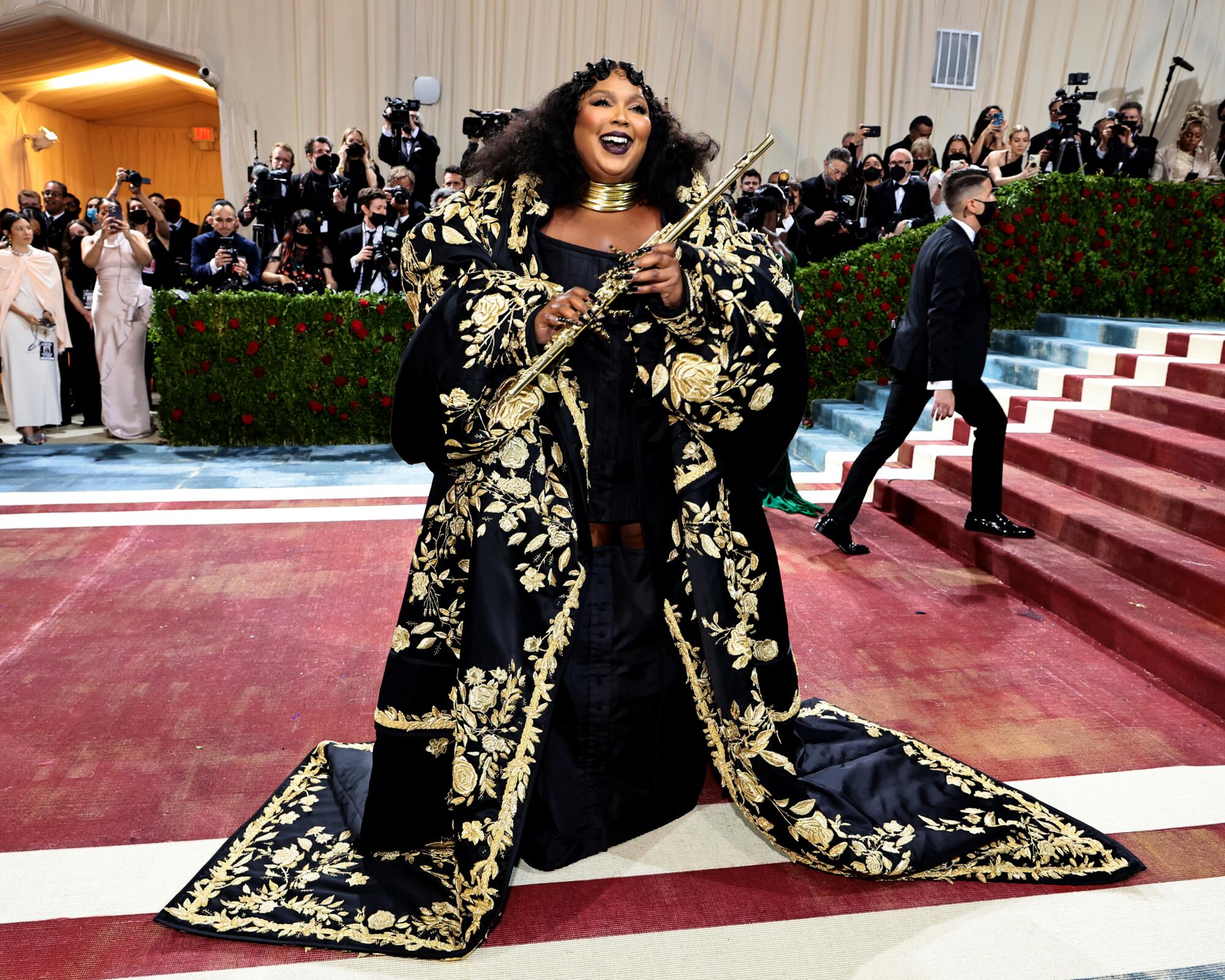
It could be difficult for her to come back from this crisis, said Elizabeth Johnson, managing director of the Neuroscience Initiative at the Wharton School of Business who has studied the marketing psychology of celebrity endorsements.
“This is quite a swing in perceptions that she may not be as authentic as she had put herself out there to be,” Johnson said. “And I think it will matter how other authentic endorsers respond. Regardless of what the outcome is in the lawsuit, how the media and other celebrities respond is going to be really important.”
Some cite the case of Ellen DeGeneres, who built her brand on being kind and nice, as a cautionary example for Lizzo. DeGeneres faced heat in 2020 after multiple staffers of her talk show leveled accusations of on-set bullying and a “toxic” atmosphere in which fear, racism and intimidation were rampant.
DeGeneres apologized to staff and released a statement taking responsibility for the workplace culture and promised to do better. However, viewership declined, the controversies never quite disappeared, and a year after the allegations first surfaced, DeGeneres announced the show would end following its 19th season in 2022.
Unlike DeGeneres, Lizzo has yet to offer an apology. Rather, she has issued a fulsome denial of the claims.
“The only way Lizzo can have full acceptance back into her fan base is if she is proven 100% correct, and she was wronged,” McPherson said. “But based on what we are seeing with the dancers and the dancers’ lawyers choosing a full media tour to tell their stories, these are two legal strategies combating each other while both creating collateral damage with their clients, with Lizzo getting the brunt of the damage.”
Times Staff Writer Jessica Gelt contributed to this report.
More to Read
Inside the business of entertainment
The Wide Shot brings you news, analysis and insights on everything from streaming wars to production — and what it all means for the future.
You may occasionally receive promotional content from the Los Angeles Times.
